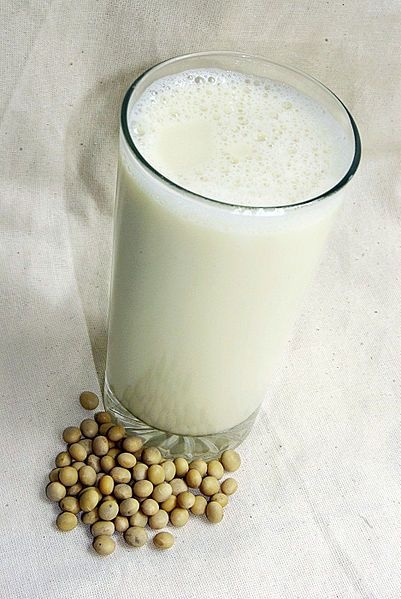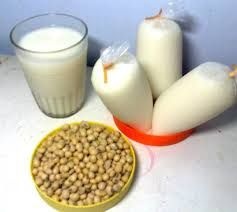Soy milk (more precisely is Sari soybean) (Hanzi: 豆漿; 豆奶) is a kind of beverage made from soybeans, and milk as the drink is called creamy similar to milk. Milk is also known as soy milk in Indonesia. Soy milk common as morning breakfast dishes along with other snacks such as youtiao. Bean milk has a composition similar to milk: 3.5% protein, 2% fat, and 2.9% carbohydrate.
According to a nutritionist, soy milk is not including the category of milk, because milk is a liquid that is only produced by the mammary gland in mammals and humans.

origin
Soy milk or soy milk is sometimes called bean milk has existed in China for thousands of years, exactly 1,900 years ago. Noted that the King of Huainan, Liu An of the Han Dynasty because the mother is ill can not chew hard foods, Liu An and then grinding the yellow beans that have been soaked for some time into a liquid which was then known as the bean milk.
Diseases of the mother and then gradually improved lead nut milk then spread to the community. Bean milk into a common beverage in Chinese culture because it is suitable to drink throughout the year.
Benefit
Bean milk believed to have many health benefits: [2]
Antioxidants
Soy contains compounds called isoflavones, which is beneficial to improve health. These compounds responsible for cell repair and prevent damage to cells caused by pollution, sunlight, and normal body processes.
Reduce the risk of heart disease
Protein and isoflavones present in soy, helps in reducing LDL cholesterol ("bad" cholesterol) and decrease the possibility of blood clotting. This in turn, reduces the risk of heart disease and stroke. Research has shown that consumption of milk containing 25 grams of soy protein for nine weeks resulted in a decrease in LDL cholesterol of 5% on average.
Prevent cancer
Isoflavones act as an anticancer agent against cancer cells. Protect the body from cancer hormone like that of the uterus, breast and prostate.
Reversing the effects of endometriosis
Soybean help in delaying the action of the body's natural estrogen, which is responsible for reducing or preventing pain during menstrual periods (heavy bleeding) and other symptoms in women.
Preventing osteoporosis
Soy protein helps in better absorption of calcium in the bones. Isoflavones are present in soy foods work to slow bone loss and inhibit bone breakdown, which in turn prevents osteoporosis.
Menopausal symptoms
The content of isoflavones in soy helps to regulate estrogen. Studies have found that soy isoflavones can reduce heartburn in the body (hot flushes) in postmenopausal women.
Good effect for diabetes and kidney disease
Protein and fiber-soluble soybean, regulate blood glucose levels and kidney filtration, thereby controlling diabetes and kidney disease.
Keeping weight
High fiber content in soybean as a tool for management (set) weight. It is a low glycemic index (GI) foods regulate blood sugar and insulin fluctuations. So it can help control hunger. This will greatly help you in the process of weight loss.




